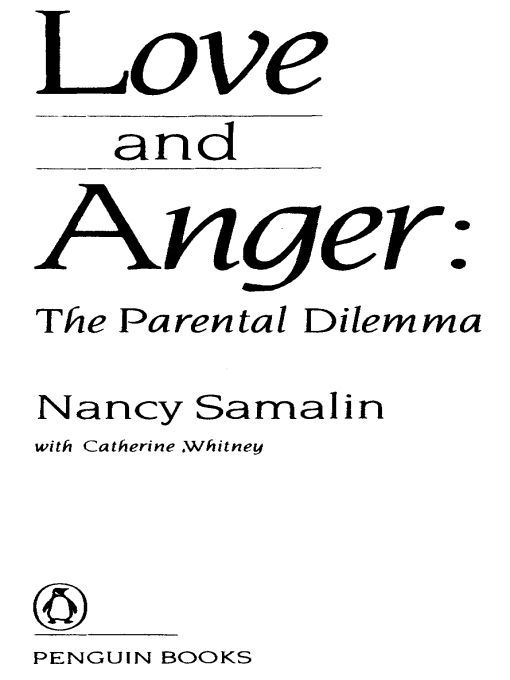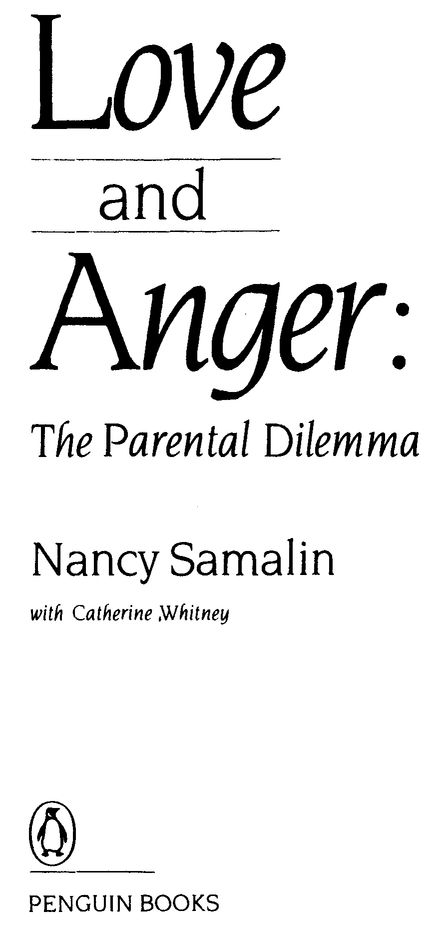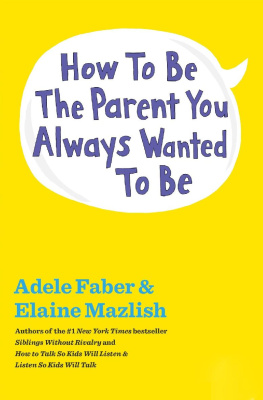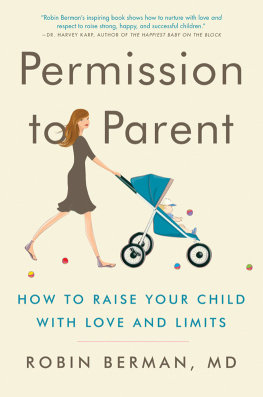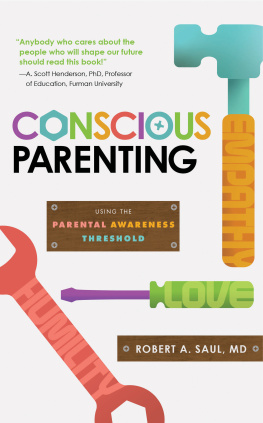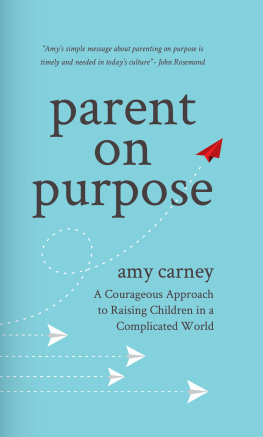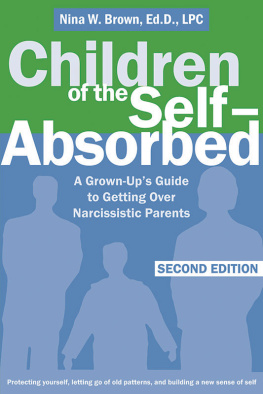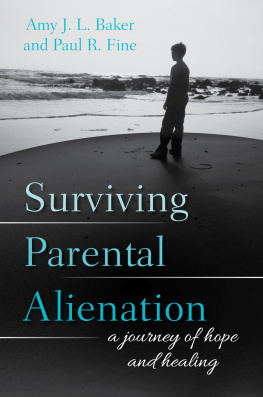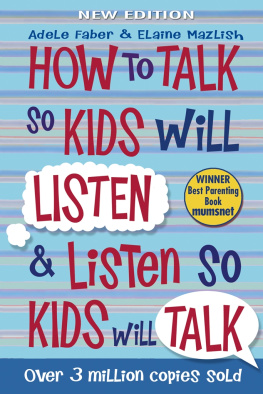Table of Contents
PENGUIN BOOKS LOVE AND ANGER
Nancy Samalin has been the founder and director of Parent Guidance Workshops since 1976. She is the author of the highly acclaimed Loving Your Child Is Not Enough: Positive Discipline That Works. She is on the adjunct faculty of The New School and Bank Street College of Education, from which she received her masters degree and a professional diploma in counseling. She presents workshops and speeches to thousands of parents and professionals in the United States and abroad.
A consulting editor and columnist for Parents magazine, she appears frequently on TV and radio throughout the country. In addition, articles about her work have appeared in The New York Times, the Chicago Tribune, Family Circle, Redbook, The Christian Science Monitor, Ladies Home Journal, and countless other magazines and newspapers.
Love and Anger: The Parental Dilemma was chosen by Child magazine as The Best Parenting Book of 1991.
To Sy,
my constant source of love
and encouragement
In several dialogues between parents and children, offensive language is used. The author is in no way endorsing swearing within the family, but has included the authentic words given by actual parents and children during moments of conflict.
Acknowledgments
I am deeply grateful to the many hundreds of parents who shared their stories, thoughts, and insights with me during the writing of this book. It takes great courage to speak openly about such a difficult and complex subject, and I hope they know that their honesty and openness will help many others like themselves.
My sincere thanks to my editor, Nan Graham, whose belief in me and great instincts have been an inspiration for both my books. Likewise, the intelligence, attention to detail, and dedication of my literary agent, Jane Dystel, gave life and shape to this book from the beginning. I also appreciate the efforts of Marcia Burch and Janet Kraybill, at Penguin, for their help with my first book, Loving Your Child Is Not Enough.
Catherine Whitney, my collaborator, has made this project a pleasure. She has added a valuable perspective to a complicated topic, and it has been a privilege to work with her. No author could wish for a more receptive, responsible, efficient co-writer.
I am also grateful to Janet Schuler, who offered invaluable assistance in organizing the survey responses, transcribing tapes, and sorting through the substantial background material used for this book.
Many professionals have shared valuable information with me on the topic of anger and preventive mental health, including Dr. Rhoda Baruch and her capable staff at the Institute of Mental Health Initiatives; Dr. John Livingston, professor of psychiatry at Harvard Medical School; and Linda Braun and her colleagues at the Center for Parenting Studies of Wheelock College.
A special thanks is in order to those people who continue to help me reach parents and professionals in my community. In particular, my appreciation goes to Dr. Allen Collins, director of the department of psychiatry at Lenox Hill Hospital, who has enabled me to present the How to Discipline with Love programs, as well as to Dr. Susan Ginsberg, who for so long has supported my work at Bank Street College of Education.
Many colleagues and friends who have helped me in countless ways include Vicki Lansky, author of many books for parents and children; Gail Reichlin, director of the Parents Resource Network; Mary Solow, head of Central Synagogue Nursery School; as well as Arlette Brauer, Jean Soichet, Ruth Hersh, Molly Haskell, and Stefania Mc-Clennen. In addition, my associates, Robin Neiman and Ann Obsatz, deserve a special note of appreciation.
My sons, Eric and Todd, have taught me a great deal about being a parent. Besides being fine young adults with excellent values, they are a pleasure to have around. Their input is always honest, frequently funny, and usually on-target. A word of gratitude as well to my sister, Ellen Zanetti, and my brother, Tom Hettleman, who are always there for me when I need them. My stepmother, Ruth Hettleman, has been consistently generous, and I appreciate her pride in my work. And, as always, a special thanks to my mother, Elizabeth Kaufmann, whom I love and admire for her courage and zest for living.
Introduction
I became more and more resentful of her seeming rudeness and expressed my frustration by becoming critical. I criticized Gingers table manners, the mess in which she left her room each morning, the way she threw her wet towel and dripping wash cloth on top of her soiled clothes, her extravagance in shopping at the most expensive stores, the loudness of her radio, and her refusal to wear her tooth-straightening apparatus.... I was obsessed with trying to make her behave.
It may surprise you to learn that the author of the above was none other than Benjamin Spock, M.D., the man to whom millions of parents have turned for advice for more than forty years. His words refer to the parental crisis that occurred thirteen years ago when he became the stepfather of an eleven-year-old girl. In that situation, Dr. Spock reminds us, he was like any other parentstruggling to see through his anger to find a loving resolution.
I use this example to demonstrate that there are no absolute answers in this business of parenting. There are only the guidelines forged from our own experiences and the experiences of others. I am all too aware that I have learned the most important lessons over the years (as well as the most effective techniques) not only from my mentor, Dr. Alice Ginott, but also from the thousands of parents who have attended my lectures and workshops. In addition, many parents have written to me in response to my first book, Loving Your Child Is Not Enough, and have told me of their struggles to use effective discipline techniqueswith the attendant successes and failures.
This caveatthat no single expert has all the answersis important to note, for you will not find a series of no-fail solutions in the pages of this book. The subject of parents and anger is one that is by its very nature fraught with complexity. It is not my goal to provide a comprehensive overview of every manifestation of anger. And I leave it to the psychiatrists to probe the deep roots of anger as human expression. Rather, my goal here is to open a window on what is often considered to be a forbidden subjectto provide insights into the common issues that trigger anger between parents and their children, and to offer practical, positive ways to redirect that anger.
Most of all, it is my hope that parents who read this book will learn to judge themselves less harshly as they begin to see that many of their expressions of anger are completely normal. By their nature, children bring to the family environment disorder, aggravation, ambiguity, and turmoil. They also bring warmth, humor, boundless energy, and creativity. Loving parents wonder how they can encourage the latter while enduring the former. That dilemma is what we will explore in this book.
TheParentalDilemma
I was the perfect father until my son was born.
the parent of a two-year-old
Sharon stormed into the living room and kicked a stray toy with her foot. Her eyes flashed with fury as she glared at her son, Todd, who was happily immersed in the mess. Damn it! she screamed. Why does this house always look like a disaster area? She didnt wait for an answer, but flung her briefcase onto a chair and dumped her coat on top of it. This is all I need after the day Ive had. Whats wrong with you anyway?

